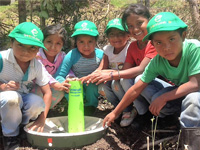Colombia - WFP Innovation Accelerator, the diary of the Groasis project
 In 2017, Groasis has been selected through the United Nations World Food Program Innovation Accelerator, to run a project in order to investigate the impact that the Groasis Ecological Water Saving Technology can have on reaching the “Zero Hunger by 2030” target. You can read the complete press message here.
In 2017, Groasis has been selected through the United Nations World Food Program Innovation Accelerator, to run a project in order to investigate the impact that the Groasis Ecological Water Saving Technology can have on reaching the “Zero Hunger by 2030” target. You can read the complete press message here.
In the diary below, you can read the daily messages from Ana Terranova, our official Groasis distributor who leads the project in Colombia in cooperation with David Arango from Biofog, our distributor in Colombia, on behalf of Groasis. To see all the pictures of this project, please check out our photo album.
Interim monitoring: meeting with the female leaders of the "Zero Hunger by 2030 project"
On September 29, 2018, we held a meeting with the leaders of the areas that are benefiting from the Project WFP – Groasis. Mr. Diego Bravo of the municipal mayor's office, the councilor and the leader of the association Amura, Laura Solano, were present. All the leaders of the areas were present too, except for the Hato Viejo leader.
Fourth time monitoring of the Zero Hunger by 2030 project
For the Zero Hunger by 2030 project in Colombia, various fruit trees have been planted in 13 different areas. The trees have been planted with the Waterboxx® plant cocoon. Read here how the progress is so far!
Third time monitoring of the Zero Hunger project in Colombia
PROJECT OVERVIEW
The socialization, training and planting of 1001 seedlings of fruit trees (papaya, avocado, blackberry, passion fruit and lemon) with Groasis Waterboxx® plant cocoon technology, in 13 areas of Almaguer, was carried out in February 2018. In this way, the First Phase of the Zero Hunger by 2030 Project began between WFP (PMA) Colombia and the Groasis Ecological Water Saving Technology of the Netherlands.
Second time monitoring of the plant areas
Monday, April 23
AREA 1 – PITAYAS
This group has planted 105 Waterboxx® plant cocoons + 2 control groups = 107 Tahiti lemon trees. The general water saving is 99%. The general mortality is 0%. The control group is in good condition.
First time monitoring of the plant areas
Despite the festivities, we have worked in the week of March 26 until April 2, carrying out the first monitoring of the results of the development of the trees and vegetables planted with the Groasis Ecological Water Saving Technology. A few days ago, I sent the first monitoring report Project Zero Hunger by 2030, I summarize activities carried out during this week:
Starting with the plantation of the fruit trees in a water saving way
Monday, February 19
This week we start the planting process at the project areas (veredas). We have programmed visiting 13 areas, with a total of 203 women members and 1015 Waterboxx® plant cocoons will be given. In total, we will plant 1030 fruit trees (140 avocados, 305 lemons, 95 papayas, 270 passion fruits, 205 blackberries and 3 control plants of each specie).
Starting with the 'Zero Hunger by 2030' project
Monday, January 29
Together with Jeyson, who is an Argonomist Engineer, we started our activities in the WFP Pasto Office. We were received by Mario and Carmen Lucía. Beside them, we met the others of the office’s staff. Everybody was very kind, and we explained them how the Groasis Ecological Water Saving Technology works, and what you can do with the Waterboxx® plant cocoon (the concept, components, species planted).















